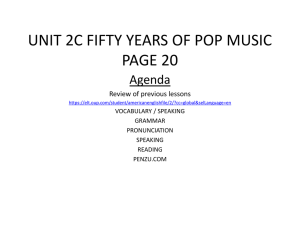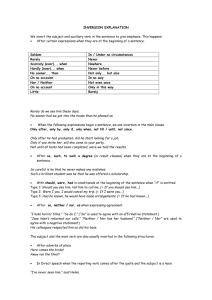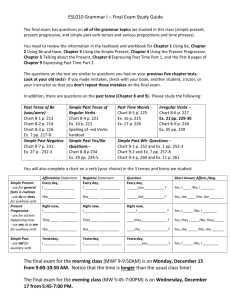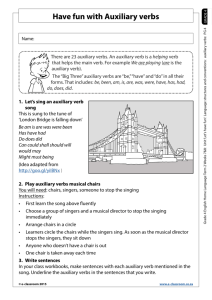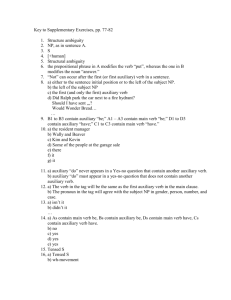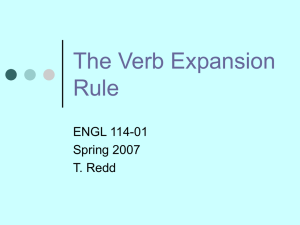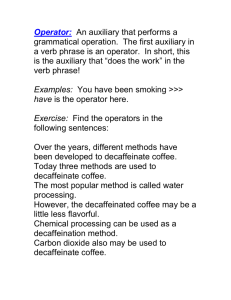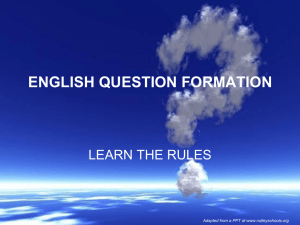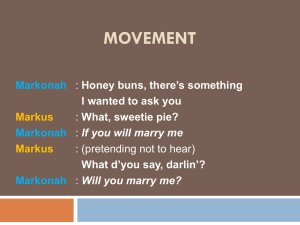Vampire Skeletons by Charles Ferro (Activities for the internet made
advertisement
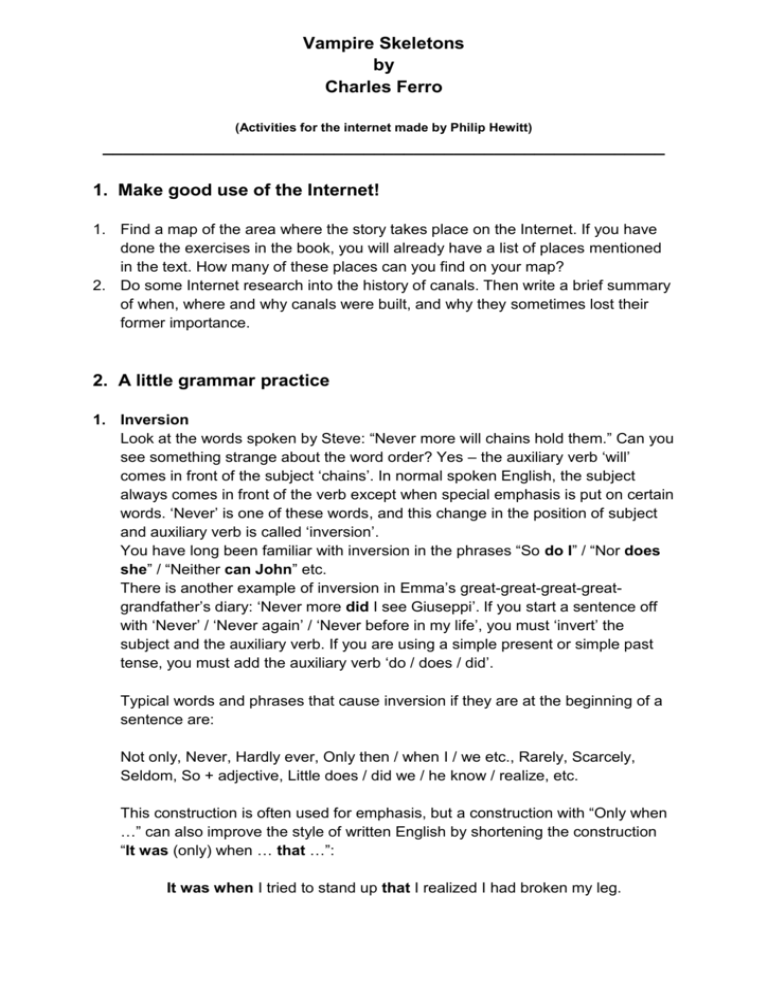
Vampire Skeletons by Charles Ferro (Activities for the internet made by Philip Hewitt) ________________________________________________________ 1. Make good use of the Internet! 1. Find a map of the area where the story takes place on the Internet. If you have done the exercises in the book, you will already have a list of places mentioned in the text. How many of these places can you find on your map? 2. Do some Internet research into the history of canals. Then write a brief summary of when, where and why canals were built, and why they sometimes lost their former importance. 2. A little grammar practice 1. Inversion Look at the words spoken by Steve: “Never more will chains hold them.” Can you see something strange about the word order? Yes – the auxiliary verb ‘will’ comes in front of the subject ‘chains’. In normal spoken English, the subject always comes in front of the verb except when special emphasis is put on certain words. ‘Never’ is one of these words, and this change in the position of subject and auxiliary verb is called ‘inversion’. You have long been familiar with inversion in the phrases “So do I” / “Nor does she” / “Neither can John” etc. There is another example of inversion in Emma’s great-great-great-greatgrandfather’s diary: ‘Never more did I see Giuseppi’. If you start a sentence off with ‘Never’ / ‘Never again’ / ‘Never before in my life’, you must ‘invert’ the subject and the auxiliary verb. If you are using a simple present or simple past tense, you must add the auxiliary verb ‘do / does / did’. Typical words and phrases that cause inversion if they are at the beginning of a sentence are: Not only, Never, Hardly ever, Only then / when I / we etc., Rarely, Scarcely, Seldom, So + adjective, Little does / did we / he know / realize, etc. This construction is often used for emphasis, but a construction with “Only when …” can also improve the style of written English by shortening the construction “It was (only) when … that …”: It was when I tried to stand up that I realized I had broken my leg. Only when I tried to stand up did I realize I had broken my leg. Rewrite these sentences, putting the words in bold type at the beginning and making any changes that are necessary: a) b) c) d) e) f) g) h) i) j) He was not only very old, his skin was like wet paper. The teacher had scarcely left the classroom than the pupils started fighting. She has hardly ever taken my advice. The coin lying on the pavement was so small that I nearly walked past it. They rarely missed a match of the local football team. I’ve never seen such a frightening sight. The postman only rarely brings me a letter. I only saw Jane when she waved to me. It was only then that I realized I had made a mistake. Children of today seldom listen to their parents’ advice. 2. Special uses of ‘would’ You know when to use ‘would’ in questions and in ‘if’-clauses. It is usually used in a future/conditional sense. But think about the use of ‘would’ in the sentence ‘I missed my friends in Utica, even though I would go back home for a day or two with my parents every two or three weeks.’ This is a past tense use – to express a habit in the past. The use of the first ‘would’ in the sentence ‘When the man or the woman would raise a hand to stop the birds, one of the ravens would bite off a piece of a finger’ would strictly speaking not be correct British English but occurs frequently in American English. It would be perfectly correct to start off with ‘When the man or the woman raised a hand…’ You should not use ‘will’ or ‘would’ in the ‘if’-clause of a true conditional sentence: If you ask your friends to come, I’m sure they will be delighted. I would be more careful if I were you. If you come across ‘will’ or ‘would’ in an ‘if’-clause, you will find that the ‘if’-clause is not part of a conditional sentence: it simply expresses a polite request: “If you will/would just wait here, I’ll see if Mr Brown can see you now.” = “Please just wait here, and I’ll see if Mr Brown can see you now.” Change the construction used in the following sentences with one of the above ‘would’-constructions: a) b) c) d) My grandfather used to spend hours fishing in the river behind his house. Please be a bit more patient. I’m sure we can solve the problem. When small animals came to her back door, she usually gave them food. In the old days young people queued for hours to get into concerts given by the Beatles or the Rolling Stones. e) Kindly stop talking and I’ll try to explain. 3. Using “do/does/did” for emphasis You can emphasize a word simply by speaking it more slowly or loudly than the other words in a sentence. In the written language – which you cannot hear – we use italics, bold type or capitals to show such emphasis: “I love ice-cream,” she said. “I love ice-cream,” she said. “I LOVE ice-cream,” she said. If you wish to put even more emphasis on a verb you can stress the auxiliary in the same way: “I am listening!” he shouted. “You can’t come in!” she cried. “I WON’T do what you tell me!” shouted the boy. If you wish to put even more emphasis on a verb that is being used without an auxiliary (i.e. in the simple present or simple past), you can use the auxiliary “do/does/did” for extra emphasis, or to contradict what another person has said: “Stop! You don’t know what you’re doing!” – “I do know what I’m doing!” “You didn’t do your homework, did you?” – “I did do my homework!” “Give him up! He doesn’t love you!” – “He does love me!” The auxiliary “do/does/did” can even be used to replace a word like “very”: He looked very tired. He did look tired. Because the auxiliary “to do” is normally only used with “not” + infinitive to make a negative verb form, the positive forms “do/does/did” used in this unusual way are not normally printed in italics or bold type, but they must always be given a very heavy stress in spoken English. Contradict these statements using the correct form of the auxiliary “to do” and making any necessary changes: a) b) c) d) e) “You didn’t bring anything to drink.” – “Oh yes I did! I …!” “He doesn’t know the answer, does he?” – “Of course! He …!” “Your friends don’t want to play football.” – “You’re wrong! They …!” “You must have forgotten to switch the lights off.” – “No! I …!” “She never helps her sister with her homework.” – “Wrong again! She …!” Add more emphasis to these statements by using the correct form of the auxiliary “to do” and leave out any words that are not needed: a) b) c) d) e) He loves her very much. I felt very happy. We like her a lot. They wanted to go with us. I believe you. 3. Looking at the new words 1. Jumbled words The letters in one of the words in each of these sentences have been mixed up (= jumbled). All the sentences are taken from the story and the jumbled word is probably one that you did not know before you read it – so if you have trouble “unjumbling” it, just check the new words in the story! a) b) c) d) e) f) g) h) i) j) When I told Steve that my hobby was rorhor movies and books, he stopped. “We can bring rope and a tighlshalf and see what’s in there.” I felt my body bemrelt. Then he tied a knot to make a polo and pulled. Many people in town have the ‘seesida’ now. So I called a book rubishlep and got a name. His clothes hung on him like clothes on a warecorcs. Steve was adzema. I felt as if my skin was covered with moving stan. “It was a hingtamer,” I said 2. Crossword Don’t worry if you find the clues too difficult. Many of the words in this crossword will be found as vocabulary footnotes in the story ‘Vampire Skeletons’! 1 2 3 4 5 7 8 10 11 13 6 9 12 14 15 17 19 20 22 18 21 23 Down 1 Another word for ‘prison’ 2 Part of a bird’s mouth 3 Another word for ‘Mom’ 6 Opposite of ‘defeat’ 8 Short form of ‘Edward’ 9 I am, you are, she … 10 To put two or more things together 12 “Can you help me do the washing-…?” 14 Very thick string 16 Opposite of ‘yes’ 17 He, she, … 20 What are you doing … the weekend? 21 American greeting Across 2 “You must give me my book back … (= before) Friday.” 4 American word for ‘walking stick’ 5 Hole in a cliff 7 Large pond 9 Frozen water 11 Very small dry pieces of earth or dirt that cover a surface 16 13 Small, sharp piece of pointed metal with feathers at one end used in a popular pub game 15 “It’s very dark in here. Switch the lights …” 18 Short form of the word ‘brother’ 19 Narrow track not used by vehicles 22 Opposite of ‘dry’ 23 “I’ll help you … you help me.”
